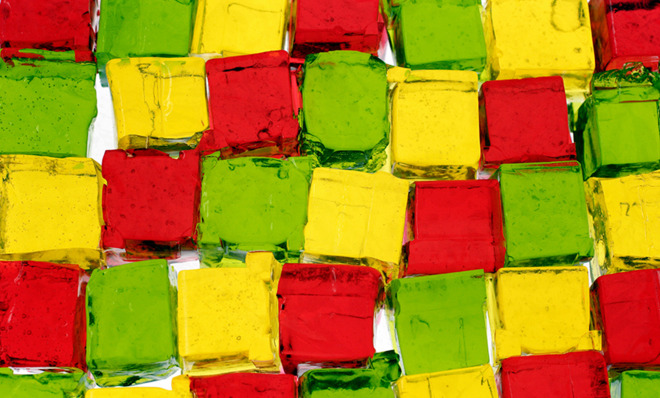Don't be grossed out by gelatin! It's a clutch addition to your home kitchen.
Sure, gelatin is obtained by boiling the bones, hides, tendons, and ligaments of farm animals. But it also helps you bake boffo chocolate cakes.

A free daily email with the biggest news stories of the day – and the best features from TheWeek.com
You are now subscribed
Your newsletter sign-up was successful

Gelatin: The mere mention of the stuff conjures images of space-age Jell-O molds and unfortunate pony feet. Where does it come from, what is it made of and how does it end up in our marshmallows and chocolate chiffon cakes? These are questions that most people don't know the answers to. People who aren't professional bakers, that is.
Enter Rose Levy Beranbaum, legendary baker and author of The Baking Bible (Houghton Mifflin Harcourt, $25). She's been using gelatin to give her lemon custards and chocolate glazes the perfect texture and consistency for over 30 years, and insists that it's a forgiving, easy-to-use ingredient for home cooks.
(More from Tasting Table: Kimchi deviled eggs)
The Week
Escape your echo chamber. Get the facts behind the news, plus analysis from multiple perspectives.

Sign up for The Week's Free Newsletters
From our morning news briefing to a weekly Good News Newsletter, get the best of The Week delivered directly to your inbox.
From our morning news briefing to a weekly Good News Newsletter, get the best of The Week delivered directly to your inbox.
First, the basics: Gelatin is a protein that is obtained by boiling the bones, hides, tendons, and ligaments of your everyday farm animals. (Despite what you heard when you were little, it can but doesn't absolutely have to come from horse hooves.) Once it's extracted and turned into a powder for mass consumption (or a dissolvable sheet for professional consumption), gelatin can be used in a number of ways: Combined with water and/or alcohol to make molds, or used to thicken and stabilize things like cakes, glazes, mousses, soups, custards, and pastry creams.
Now that that's out of the way, here's Beranbaum's advice for successfully adding gelatin to your kitchen arsenal.
Always measure out your gelatin. "Never trust what the package says — the actual amount is rarely what is advertised, and a few grams can make a big difference," says Beranbaum.
(More from Tasting Table: Turkey-to-table)
A free daily email with the biggest news stories of the day – and the best features from TheWeek.com
Timing is everything. "Adjust the amount of gelatin slightly, depending on when you're going to be serving the dish," says Beranbaum. "Gelatin continues thickening over 24 hours, even when it's in the fridge, so use a little less if you're going to be serving the next day and a little more if you're going to be serving day of."
Soak, then heat. Soak your gelatin in cold water for about five minutes before heating it so the individual grains of gelatin can hydrate, or "bloom," before they're used. Once they're hydrated, heat the gelatin to dissolve it in the water. A microwave is the fastest way to do this (zap it for about a 30 seconds), but you can also use a water bath for two or three minutes. When the gelatin has dissolved, add it to whatever you're making.
Boil to your heart's content. Despite what others may have warned you, feel free to boil the gelatin several times over. In Beranbaum's experience, boiling has a negligible effect on its strength.
(More from Tasting Table: Holy cannoli)
Freeze away. According to Beranbaum, the common wisdom is wrong here once again: Freezing a dessert with gelatin does not diminish the gelatin's efficacy. Go crazy.
Best friends forever. Keep gelatin for as long as you like. Unlike the eggs in the back of your refrigerator, as long as it's not exposed to moisture, it won't go bad.
Tasting Table is a culinary lifestyle brand that obsesses over what to eat and drink so you don't have to. It's like having a foodie best friend to distill the culinary world into must-do, must-eat, and must-know recommendations, on everything from the best Thai in the Village to the top tequila pours in Outer Mission. Hungry yet?
-
 Health insurance: Premiums soar as ACA subsidies end
Health insurance: Premiums soar as ACA subsidies endFeature 1.4 million people have dropped coverage
-
 Anthropic: AI triggers the ‘SaaSpocalypse’
Anthropic: AI triggers the ‘SaaSpocalypse’Feature A grim reaper for software services?
-
 NIH director Bhattacharya tapped as acting CDC head
NIH director Bhattacharya tapped as acting CDC headSpeed Read Jay Bhattacharya, a critic of the CDC’s Covid-19 response, will now lead the Centers for Disease Control and Prevention